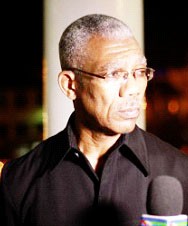President David Granger on Monday challenged the private sector to find the “will” to make better use of the country’s resources as it looks to revive the economy.
“…The resources are here but the will is not there,” Granger told a modest gathering at the 23rd Annual General Meeting of the Private Sector Commission (PSC), which was held at the Pegasus Hotel.
Granger congratulated the commission on its recent commitment to launch an economic forum to plan an economic revival for the country. Officials from the PSC, public sector, trade unions, political parties and government are expected to be among those participating at the forum.

Granger, who noted that the private sector has played a part in the economic recovery programme, was hopeful that the PSC will continue its work with better results. “I would like to see an economic plan which makes better use of our resources. We have the best source products in the Caribbean…,” he said.
He pointed out that Guyana has wildlife which can be capitalised on but only if it is protected. He said travelers are looking for more than sun and sand and would “pay good money” to come and see jaguars and fresh water fish and other wildlife here in Guyana. “So let us protect our wildlife. Let us use our source product,” he stressed.
Granger also emphasised the need for a thriving manufacturing industry, with factory and economic centres focusing on agro processing and other related enterprises.
Further, he said ways to generate electricity in hinterland communities need to be found, particularly so that children can study at night. He made this statement after pointing out that solar panels were given out in those areas during the just concluded elections campaign.
Granger stated that there are over 100 places in the country that can generate hydropower. “Not one, not two, a hundred,” he said adding that this country has the potential to exploit power in the forms of solar energy, hydroelectricity and wind power. He said that these are the areas that the private sector can explore and which can even interest the minds in the opposition.
Granger spoke too of protecting the country’s mineral resources. He said that we now see petroleum on the horizon and that as well as the other resources have to be protected.
He said the Essequibo region of the country, which is being claimed by Venezuela, contains the bulk of the country’s resources and now that there is petroleum exploitation, “we see the age old problem resurrecting.”
He noted that the members of the private sector, the Commonwealth and the British government have come out in support of government in dealing with this latest claim, which he called a “monkey on our back.”
Granger said the ongoing territorial controversy, which is being fueled by Venezuela, has to be settled once and for all and he reiterated earlier intimations that government’s plan was to deal with it in a judicial manner through the United Nations. He said that such a step is necessary so that future generations would not be pestered.
Protection
Meanwhile, PSC Chairman Ramesh Persaud said the commission is pleased at the recent passage of the Anti-Money Laundering and Countering the Financing of Terrorism bill since it now gives legitimate businesses a sense of comfort.
Noting that immense efforts were directed to get the political parties in parliament to pass the legislation so that Guyana can be compliant with international standards, he said that the passage is a very positive step towards protecting “the legitimate business from unfair competition, criminal enterprises and tax evasion.”
“We take this the opportunity to urge the business community to ensure full adherence and …government will ensure the full operationalisation and implementation of this legislation,” he added.
Persaud also detailed the PSC’s work over the past year, including during the national governance crisis that developed when Parliament was prorogued. During this period, he said the commission met tirelessly with all political parties and several members of civil society in an attempt to broker a solution to the impasse. Its proposals did not meet with success and the stalemate continued until general elections were announced in 2015, he said.
Granger, during his address, said the PSC “did try. It did support the call for local government elections. It did support the call for dialogue and I would like to thank it for its efforts although they were futile in the sense that we were not able to get even a presidential debate. But thank you very much and you keep on keeping on.”
Persaud told those gathered that 2014 had many challenges and opportunities for the sector but he noted that while economic growth in Latin America and the Caribbean averaged only 1.2%, Guyana’s economy grew by 3.9%. “However, the economy grew at a slower rate than in 2013 when growth reached 5.2%. The slower rate of growth was occasioned by lower prices for commodities, particularly gold,” he said while adding that growth of the Gross Domestic Product in Guyana was particularly robust when global growth was stymied by the economic crisis but has slowed even as the world economy is recovering.
Later, Persaud outlined a five-point wish list for the sector and this includes faster and more reliable internet access, policies that promote an environment of fair play and equal opportunity regardless of whether a business is large or small, local or foreign, and a safer community for the sector to operate in.




